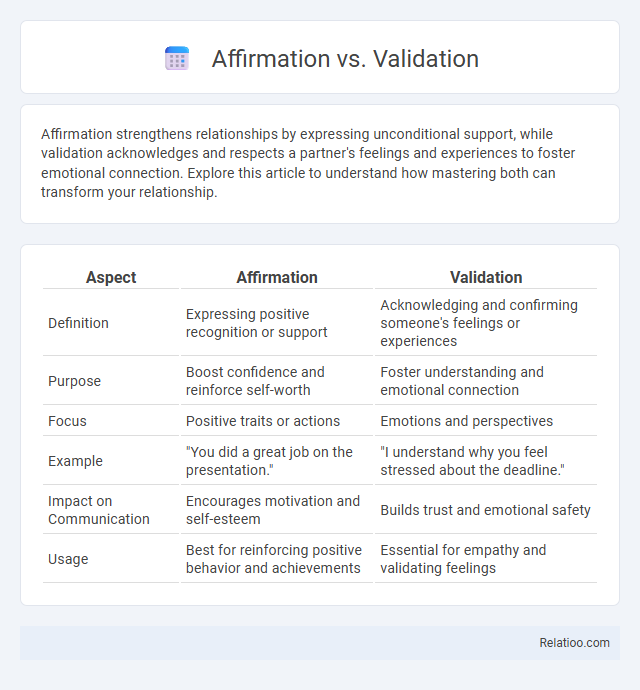Affirmation strengthens relationships by expressing unconditional support, while validation acknowledges and respects a partner's feelings and experiences to foster emotional connection. Explore this article to understand how mastering both can transform your relationship.
Table of Comparison
| Aspect | Affirmation | Validation |
|---|---|---|
| Definition | Expressing positive recognition or support | Acknowledging and confirming someone's feelings or experiences |
| Purpose | Boost confidence and reinforce self-worth | Foster understanding and emotional connection |
| Focus | Positive traits or actions | Emotions and perspectives |
| Example | "You did a great job on the presentation." | "I understand why you feel stressed about the deadline." |
| Impact on Communication | Encourages motivation and self-esteem | Builds trust and emotional safety |
| Usage | Best for reinforcing positive behavior and achievements | Essential for empathy and validating feelings |
Understanding Affirmation: Definition and Purpose
Understanding affirmation involves recognizing it as a positive statement that reinforces self-worth and encourages confidence by emphasizing personal strengths and values. Validation differs by acknowledging and accepting another person's feelings or experiences as genuine, fostering emotional support and connection. Affirmation's primary purpose is to build internal motivation and self-esteem, enabling individuals to overcome challenges through constructive self-talk and empowering beliefs.
What is Validation? Key Concepts Explained
Validation involves recognizing and accepting your emotions, thoughts, and experiences as valid, regardless of whether others agree. It differs from affirmation, which reinforces positive qualities or achievements, by focusing on empathy and understanding your internal state. Your sense of being heard and understood is strengthened through validation, fostering emotional resilience and self-awareness.
The Psychological Impact of Affirmation
The psychological impact of affirmation significantly differs from validation and recognition, as affirmation fosters internal motivation and self-worth by reinforcing your intrinsic values and beliefs. While validation acknowledges your feelings and affirms your emotional experience, affirmation goes deeper by promoting resilience and positive self-identity. This empowering effect enhances mental health, reduces anxiety, and strengthens your overall psychological well-being.
Validation and Emotional Well-Being
Validation is the process of recognizing and accepting another person's feelings, thoughts, or experiences as understandable and legitimate, which plays a crucial role in promoting emotional well-being. Emotional validation reduces feelings of isolation, decreases stress, and enhances self-esteem by fostering a sense of connection and support. In contrast to affirmation, which often involves positive reinforcement or encouragement, validation emphasizes empathy and acknowledgment of existing emotions, making it fundamental in therapeutic settings and healthy relationships.
Affirmation vs Validation: Core Differences
Affirmation involves expressing positive recognition or support to reinforce someone's self-worth or actions, while validation focuses on acknowledging and accepting another's feelings, experiences, or perspectives as legitimate. Affirmation builds confidence by highlighting strengths and achievements, whereas validation fosters emotional understanding by confirming that emotions are real and understandable. The core difference lies in affirmation's emphasis on boosting self-esteem versus validation's role in emotional acceptance and empathy.
When to Use Affirmation in Communication
Use affirmation in communication to acknowledge and support someone's feelings, fostering trust and openness without necessarily agreeing with their viewpoint. Affirmation is effective when the goal is to boost confidence and validate personal experience, especially in emotionally charged conversations. Unlike validation, which emphasizes understanding emotions as valid, affirmation focuses on reinforcing positive qualities or efforts to encourage continued growth.
Situations That Call for Validation
Situations that call for validation often involve emotional experiences where individuals seek acknowledgment and understanding rather than just positive reinforcement. Validation affirms a person's feelings and perspectives as legitimate, helping to build trust and emotional safety during conflicts, stress, or uncertainty. Unlike affirmation, which emphasizes positive qualities or achievements, validation addresses the need for empathy and connection in challenging interpersonal interactions.
The Role of Affirmation and Validation in Relationships
Affirmation and validation play crucial roles in fostering healthy relationships by enhancing emotional connection and trust. Affirmation involves expressing positive recognition and support for a partner's qualities or actions, reinforcing their sense of self-worth. Validation acknowledges and accepts a partner's feelings or experiences without judgment, promoting empathy and mutual understanding essential for relationship growth.
Common Misconceptions about Affirmation and Validation
Common misconceptions about affirmation and validation often confuse these essential concepts, leading to miscommunication in relationships and personal growth. Affirmation involves recognizing and expressing appreciation for one's qualities or efforts, while validation acknowledges and accepts another person's feelings and experiences as legitimate. Understanding the distinction helps You foster healthier emotional connections and avoids the mistake of using affirmation when validation is needed, or vice versa.
Integrating Affirmation and Validation for Personal Growth
Integrating affirmation and validation enhances your personal growth by fostering both self-acceptance and emotional awareness. Affirmation reinforces positive beliefs about yourself, while validation acknowledges and honors your feelings and experiences as real and important. Combining these practices creates a balanced mindset, promoting resilience, confidence, and deeper self-understanding.

Infographic: Affirmation vs Validation
 relatioo.com
relatioo.com